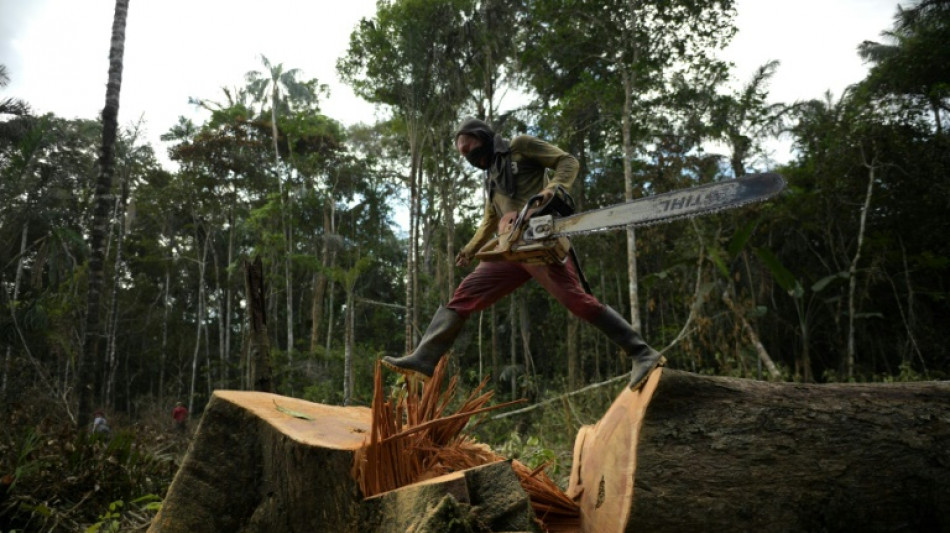
-
 Vance discusses migration during Vatican meeting with pope's right-hand man
Vance discusses migration during Vatican meeting with pope's right-hand man
-
Afghan FM tells Pakistan's top diplomat deportations are 'disappointment'

-
 British cycling icon Hoy and wife provide solace for each other's ills
British cycling icon Hoy and wife provide solace for each other's ills
-
Money, power, violence in high-stakes Philippine elections

-
 Iran, US hold second round of high-stakes nuclear talks in Rome
Iran, US hold second round of high-stakes nuclear talks in Rome
-
Japanese warships dock at Cambodia's Chinese-renovated naval base

-
 US Supreme Court pauses deportation of Venezuelans from Texas
US Supreme Court pauses deportation of Venezuelans from Texas
-
Pakistan foreign minister arrives in Kabul as Afghan deportations rise

-
 Heat and Grizzlies take final spots in the NBA playoffs
Heat and Grizzlies take final spots in the NBA playoffs
-
Iran, US to hold second round of high-stakes nuclear talks in Rome

-
 Humanoid robots stride into the future with world's first half-marathon
Humanoid robots stride into the future with world's first half-marathon
-
Migrant's expulsion puts Washington Salvadorans on edge

-
 Plan for expanded Muslim community triggers hope, fear in Texas
Plan for expanded Muslim community triggers hope, fear in Texas
-
Pakistan foreign minister due in Kabul as deportations rise

-
 White House touts Covid-19 'lab leak' theory on revamped site
White House touts Covid-19 'lab leak' theory on revamped site
-
Dodgers star Ohtani skips trip to Texas to await birth of first child

-
 US senator says El Salvador staged 'margarita' photo op
US senator says El Salvador staged 'margarita' photo op
-
Ford 'adjusts' some exports to China due to tariffs

-
 Thomas maintains two-shot lead at RBC Heritage
Thomas maintains two-shot lead at RBC Heritage
-
US to withdraw some 1,000 troops from Syria

-
 Four killed after spring storms wreak havoc in the Alps
Four killed after spring storms wreak havoc in the Alps
-
Spurs' Popovich reportedly home and well after 'medical incident'

-
 Trump goes to war with the Fed
Trump goes to war with the Fed
-
Celtics chase second straight NBA title in playoff field led by Thunder, Cavs

-
 White House site blames China for Covid-19 'lab leak'
White House site blames China for Covid-19 'lab leak'
-
Norris edges Piastri as McLaren top Jeddah practice

-
 Trump warns US could ditch Ukraine talks if no progress
Trump warns US could ditch Ukraine talks if no progress
-
Judge denies Sean 'Diddy' Combs push to delay trial

-
 80 killed in deadliest US attack on Yemen, Huthis say
80 killed in deadliest US attack on Yemen, Huthis say
-
Lebanon says two killed in Israeli strikes in south

-
 Trump says US will soon 'take a pass' if no Ukraine deal
Trump says US will soon 'take a pass' if no Ukraine deal
-
F1 success is 'like cooking' - Ferrari head chef Vasseur

-
 Cycling mulls slowing bikes to make road racing safer
Cycling mulls slowing bikes to make road racing safer
-
Macron invites foreign researchers to 'choose France'

-
 Klopp 'happy' in new job despite Real Madrid rumours: agent
Klopp 'happy' in new job despite Real Madrid rumours: agent
-
Alcaraz into Barcelona semis as defending champion Ruud exits

-
 Vance meets Italy's Meloni before Easter at the Vatican
Vance meets Italy's Meloni before Easter at the Vatican
-
Evenepoel returns with victory in Brabantse Pijl

-
 Maresca confident he will survive Chelsea slump
Maresca confident he will survive Chelsea slump
-
Mob beats to death man from persecuted Pakistan minority

-
 Lebanon says one killed in Israeli strike near Sidon
Lebanon says one killed in Israeli strike near Sidon
-
Arsenal's Havertz could return for Champions League final

-
 US officials split on Ukraine truce prospects
US officials split on Ukraine truce prospects
-
Client brain-dead after Paris cryotherapy session goes wrong

-
 Flick demands answers from La Liga for 'joke' schedule
Flick demands answers from La Liga for 'joke' schedule
-
'Maddest game' sums up Man Utd career for Maguire

-
 Trial opens for students, journalists over Istanbul protests
Trial opens for students, journalists over Istanbul protests
-
Gaza rescuers say Israeli strikes kill 24 after Hamas rejects truce proposal

-
 'Really stuck': Ukraine's EU accession drive stumbles
'Really stuck': Ukraine's EU accession drive stumbles
-
'Not the time to discuss future', says Alonso amid Real Madrid links


Amazon nears climate 'tipping point' faster than expected
Hammered by climate change and relentless deforestation, the Amazon rainforest is losing its capacity to recover and could irretrievably transition into savannah, with dire consequences for the region and the world, according to a study published Monday.
Researchers warned that the results mean the Amazon could be approaching a so-called "tipping point" faster than previously understood.
Analysing 25 years of satellite data, researchers measured for the first time the Amazon's resilience against shocks such as droughts and fires, a key indicator of overall health.
This has declined across more than three-quarters of the Amazon basin, home to half the world's rainforest, they reported in Nature Climate Change.
In areas hit hardest by destruction or drought, the forest's ability to bounce back was reduced by approximately half, co-author Tim Lenton, director of the University of Exeter's Global Systems Institute, told AFP.
"Our resilience measure changed by more than a factor of two in the places nearer to human activity and in places that are driest," he said in an interview.
Climate models have suggested that global heating -- which has on average warmed Earth's surface 1.1 degrees Celsius above preindustrial levels -- could by itself push the Amazon past a point of no return into a far drier savannah-like state.
If carbon pollution continues unabated, that scenario could be locked in by mid-century, according to some models.
"But of course it's not just climate change -- people are busy chopping or burning the forest down, which is a second pressure point," said Lenton.
"Those two things interact, so there are concerns the transition could happen even earlier."
Besides the Amazon, ice sheets on Greenland and the West Antarctic, Siberian permafrost loaded with CO2 and methane, monsoon rains in South Asia, coral reef ecosystems, and the Atlantic ocean current are all are vulnerable to tipping points that could radically alter the world as we know it.
- Global fallout -
Deforestation in Brazil has surged since far-right President Jair Bolsonaro took office in 2019, hitting a 15-year high last year.
Scientists reported recently that Brazil's rainforest -- 60 percent of the Amazon basin's total -- has shifted from a "sink" to a "source" of CO2, releasing 20 percent more of the greenhouse gas into the atmosphere over the last decade than it absorbed.
Terrestrial ecosystems worldwide have been a crucial ally as the world struggles to curb CO2 emissions. Vegetation and soil globally have consistently absorbed about 30 percent of carbon pollution since 1960, even as emissions increased by half.
"Savannification" of the Amazon would be hugely disruptive, in South America and across the globe.
Some 90 billion tonnes of CO2 stored in its rainforest -- twice worldwide annual emissions from all sources -- could be released into the atmosphere, pushing global temperatures up even faster.
Regionally, "it's not just the forests that take a hit", said Lenton. "If you lose the recycling of rainfall from the Amazon, you get knock-on effects in central Brazil, the country's agricultural heartland."
Ominously, the new findings marshall data pointing in the same direction.
"Many researchers have theorised that a tipping point could be reached," said co-author Niklas Boers, a professor at the Potsdam Institute for Climate Impact Research in Germany.
"Our study provides vital empirical evidence that we are approaching that threshold."
- When you're sure, it's too late -
To assess change in the resilience of the rainforest, Lenton, Boers and lead author Chris Boulton from Exeter University analysed two satellite data sets, one measuring biomass and the other the "greenness" of the canopy.
"If too much resilience is lost, dieback may become inevitable -- but that won't become obvious until the major event that tips the system is over," said Boers.
There may be a "saving grace" that could pull the Amazon back from the brink.
"The rainforest naturally has a lot of resilience -- this is a biome that weathered the ice ages, after all," said Lenton.
"If you could bring the temperature back down again even after passing the tipping point, you might be able to rescue the situation."
"But that still puts you in the realm of massive carbon dioxide removal, or geoengineering, which has its own risks."
Just under 20 percent of the Amazon rainforest -- straddling nine nations and covering more than five million square kilometres (two million square miles) -- has been destroyed or degraded since 1970, mostly for the production of lumber, soy, palm oil, biofuels and beef.
J.Horn--BTB


